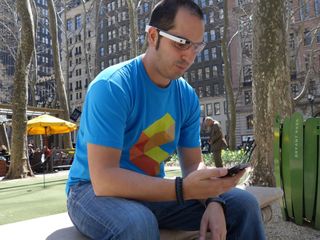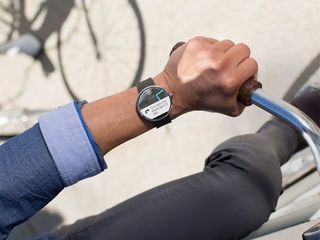Android Wear: The step backward we all really want

Android Wear is coming this week, and before its official launch it is already more popular than Google Glass. This simultaneously excites and frustrates me, because in several ways I feel that Android Wear is a step backwards from Glass. Well, not technically a step backwards. More like the step that should have happened first, which makes it easy to perceive it as a step backwards.
Glass isn't a Google product. It's Google [X] Moonshot project that was thrust into the public eye (get it?) while straddling the consumer market. It's too expensive to be a real product, not supported like a real product, and at the same time is now available for anyone to purchase and experience. This could never happen with any other kind of technology, and it probably shouldn't have happened with Glass in the way that it did. GM couldn't make a future car that only kind of worked most of the time available to the public for three times what it should cost and have everything be OK. (It has enough issues with its current-day products, for that matter.) That's probably a false equivalence on several levels, but the point is that this is Google trying something new with the end goal of enhancing the state of the art by learning more about how businesses and people would interface with this kind of technology.
Unfortunately, we as people don't think on high levels like Google's [X] team was when this plan was conceived. Instead, the world largely perceives this as a consumer product and judges it thus. This causes everything from price and feaure criticism to a downright tribal reaction to the asymmetrical change to the existing list of acceptable headgear. It looks funny, and it's expensive, so rapid judgement on a tribal level is all too common. I have several colleagues that say "Russell is the only Glass user I've seen that doesn't look like a total douche while wearing his unit" and it took me a while to come to terms with that. I wasn't doing anything different from my fellow Explorers, so the only conclusion I could come to was the community reaction. It was ok to these people because they knew me and liked me beforehand. This is problematic on an entirely different level, and not something I think most people are equipped to deal with from either perspective.
Enter Android Wear. It's significantly less expensive, focuses on combining several cultural norms into a single concept, and places a premium on being visually stunning in every instance we've seen so far. Android Wear doesn't actually accomplish anything though, it exists under the pretense that lifting your wrist is less effort than reaching into your pocket and unlocking your phone. While this is true, it's a solution in search of a problem. It's also the next tech craze that is going to send a lot of people reaching for their wallets next week, because they have already been convinced that they need this in their lives.

So why is this arguably unnecessary tech a step backwards? Because it's the logical step in between data on your phone and data in your eye. The features that make Android Wear great are things like Google Now and selective notification glances. Turn by turn navigation and things of that nature in a form that keeps you potentially more in touch with the real world. It's all too obvious that the next step for something like Wear is to remove the wrist element altogether and make the tech exist as part of your periphery.
I'm excited for Android Wear, but it also saddens me in a way. The socially accepted wrist glance and the imaginary outrage (in this case I'm saying that the reasons for the outrage are imaginary, not the outrage itself) for Glass will propel developers to do some seriously cool things for the platform. That development will probably lead to some amazing things that we can't quite imagine yet, but through all of it I think it will still exist to me as an unnecessary application of the brake pedal in the evolution of wearable technology so everyone else can catch up and realize that we could be doing more if we moved the tech from the wrist to the eye.
Be an expert in 5 minutes
Get the latest news from Android Central, your trusted companion in the world of Android

